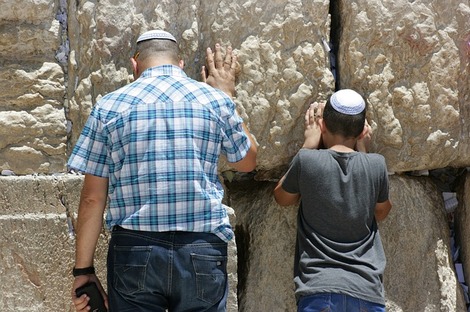I sat deeply in my chair as the reader chanted the blessing before the Haftarah portion for the first day of Rosh Hashanah. It's a story with which I am very familiar. Hannah, belittled and berated by her peers because of her inability to have children, petitions God for a miracle. I have been in her shoes, unendingly reproached for being unable to have a child. There is the usual a litany of admonishments and advice, some of it well-intended, much of it plain cruel. We are commanded to build families. For those of us who are unable to do so, or simply don't want to, life in the Jewish community can be difficult. As it did with Hannah, my childlessness has produced a river of tears.
Childlessness is usually addressed as a women's issue, but it is a concern that affects men too. Men also have struggles with fertility, either their own or their partner's. In his soon to be released book, The Pater: My Father, My Judaism, My Childlessness, Elliot Jager shares the courageous stories of men who are childless. In this moving book, combining Jager's story with those of other childless men, Jager recounts the difficulties of being childless in a culture that demands children. As we in the Diaspora nearly bankrupt ourselves, literally and spiritually, with endless IVF treatments or consider the equally expensive and complex options of surrogacy or adoption, we are reminded that without a child, we will have no one to say Kaddish for us when we are gone. We are labeled as "akar" or "akara." For men, the term for childlessness literally means uprooted: from community, life and the World to Come. For women, the term means "barren," producing nothing, and in a greater sense, with nothing to offer. Jager points out that those of us who cannot have children are more than these declarations. We are far from dead, and though there is a profound grief at being unable to have a child though we wanted one, we do not need a child to be whole, productive, giving members of our communities.
To be childless not-by-choice is to be aggrieved. I don't know whether or not I wanted to have a child, probably not, but I wanted to have the option. Although I am invited often, I don't go to the children's services with my contemporaries and I skip the b'nai mitzvot of children I don't personally know. When I was told by an influential member of a synagogue that people like me, akara, have no place in the community, no value, I left that shul without looking back. It grieves me to be unable to have a child, to have no one to teach the Shabbat prayers to or share the family kugel recipe with. But I and the men in Jager's book are far from barren. We are at the tops of our fields, community minded, and ready and willing to give of ourselves in all the ways we are able.
God does not require of me that which I am physically incapable of giving. In these days between Rosh Hashanah and Yom Kippur, look to those of us who are different - who are childless, gay, disabled, cognitively-impaired, and the like - to see what we have to offer. Empathy and compassion can be born out of looking at the world through another's eyes. Developing these traits in greater measure is one of the gifts of this season.

